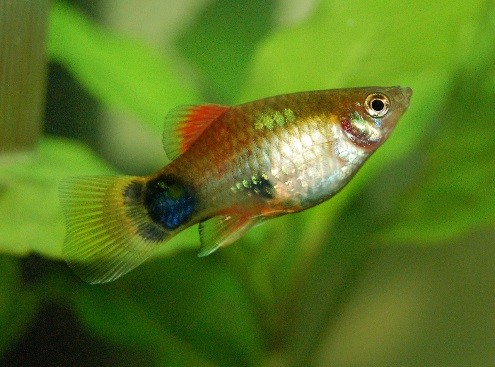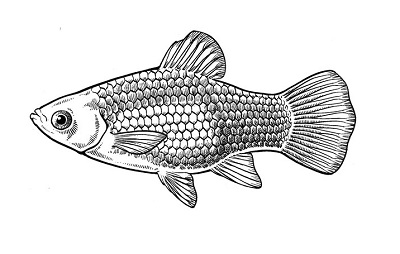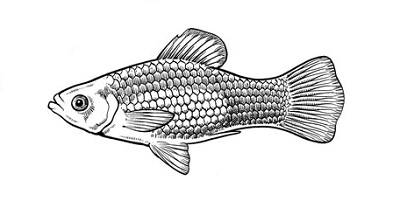Platy
Platy © Marrabbio2 Creative Commons
Illustration of a female platy
© Queensland Government
© Queensland Government
Illustration of a male platy
© Queensland Government
© Queensland Government
Platies are popular aquarium fish but have become a pest in some Queensland waterways due to people releasing them. Give unwanted aquarium fish to your friends or a pet shop rather than letting them go in the wild. Releasing live fish into Queensland waters is illegal as a breach of your general biosecurity obligation under the Biosecurity Act 2014.
Scientific name
Xiphophorus maculatus
Description
- Popular aquarium fish growing to around 6cm.
- Stout fish with rounded dorsal (upper) and tail fins and an upturned mouth.
- In aquariums, they are highly variable in colours, but in the wild they are yellow-olive brown with 2–5 distinct bars along their body.
Habitat
- Warm springs, canals and ditches with slow-moving water, silty bottoms and weedy banks.
- Survives in waterways that are too degraded for native fish.
Distribution
- Native to Central America.
- Established in many areas including Hawaii, the United States, Puerto Rico, Palau, Madagascar, Jamaica, Columbia, Sri Lanka, Bahamas and Australia.
- Queensland's many coastal drainages around Brisbane and in the Wet Tropics region in North Queensland.
Life cycle
Breeding
- Reaches sexual maturity after 3–4 months.
- Reproduces often and in high numbers.
- Are livebearers (gives birth to live young).
Diet
- Omnivorous.
- Feeds on worms, crustaceans, insects and plant matter.
Impacts
- Classified as potential pests in countries where they have been introduced.
- Competes with native fish for food and space, dominates waterways due to high ability to reproduce and to survive in habitats not suitable for native fish.
- Often found in waterways that are degraded.
Control
- If you catch platies in the wild, humanely kill them and do not return them to the water. Report all invasive fish captures through our online reporting form. Take photos, if possible.
Legal requirements
- Under the Biosecurity Act 2014 everyone has a general biosecurity obligation (GBO) to take reasonable and practical steps to minimise the risks associated with spreading or introducing pest fish. This includes any fish that is not native to Australia.
- To ensure you have met your GBO
- don't stock non-native fish in outdoor ponds
- don't release aquarium fish or aquarium water into waterways
- do what you reasonably can to stop a potential biosecurity threat from spreading. This could include reporting the issue to Biosecurity Queensland.
Further information
- Biosecurity Act 2014 and Biosecurity Regulation 2016
- Grant, EM 1997, Grant's guide to fishes, EM Grant Pty Ltd, Brisbane
- Managing the biosecurity risk of ornamental aquarium fish in Queensland fact sheet (PDF, 2.1MB)
- FishBase—a global information system on fishes


